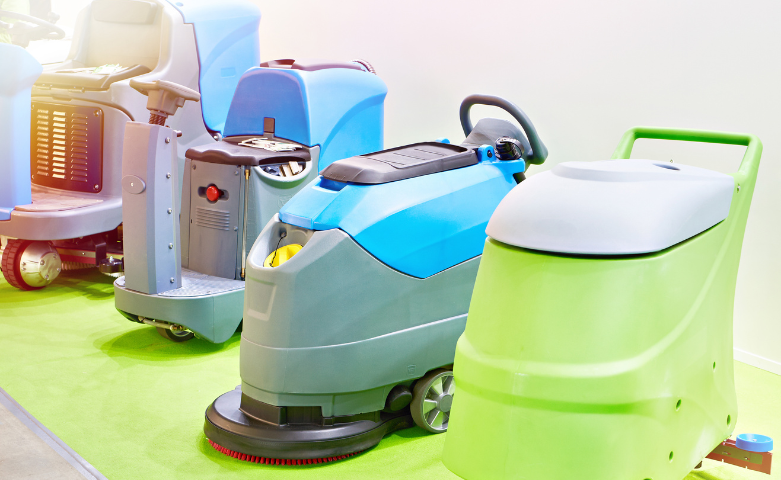
8 Tips for Maintaining Your Commercial Floor Cleaning Machines
Are you struggling to maintain your commercial floor cleaning machines? Without proper care, they can underperform and lead to costly repairs. This is a common concern for any shop and small business that needs to clean various floor types effectively.
Fortunately, you can easily keep your floor scrubber and cleaning machines in top shape by following essential maintenance tips. Regular cleaning, checking brushes, and inspecting tanks are straightforward steps to ensure your machines operate efficiently, deliver quality results, and avoid unexpected breakdowns.
In the following sections, we'll dive into practical tips for maintaining your cleaning machines so you can keep them running smoothly and your floors spotless. Before we get into details, browse these I-Fresh commercial cleaning products you can use for your business.
TL;DR: How to Maintain Your Commercial Floor Cleaners
- Daily Cleaning: Wipe surfaces, remove dirt from brushes, and check for wear.
- Brushes & Pads: Regularly check and replace worn brushes for optimal cleaning.
- Tanks: Clean and inspect solution and recovery tanks after each use.
- Battery Health: Charge batteries fully, inspect connections, and check for corrosion.
- Lubrication & Belts: Lubricate moving parts monthly and check belt tension and damage.
- Manufacturer’s Schedule: Follow the recommended maintenance schedule for best results.
- Storage: Store machines in a dry, cool place on a flat surface.
- Staff Training: Train staff on proper usage and maintenance to ensure efficient operation.
1. Perform Daily Cleaning and Inspection
Daily cleaning and inspection of floor scrubber machines keep them in top condition. This involves wiping down surfaces, removing dirt from brushes, and checking for wear. It's a quick, routine task that any cleaning team member can do, ensuring fast and flexible cleaning in commercial spaces.
Cleaning prevents damage to the machine and improves performance, making it highly effective for extensive use. Look out for leaks, loose parts, or unusual noises. Catching issues early ensures the scrubbers stay efficient, providing optimal results for a range of floors, such as tile and concrete.
Want to ensure your cleaning routine is both practical and eco-friendly? Learn why many use eco-friendly cleaning products and how they can complement your daily maintenance practices.
2. Regularly Check and Replace Brushes and Pads
Brushes and pads are crucial parts of industrial floor scrubbers. Over time, they wear down, reducing cleaning efficiency.
Regularly checking and replacing them ensures the scrubbers operate efficiently. Depending on usage, this task might be done weekly or monthly. The cleaning team can easily browse the machine's manual to identify suitable replacement accessories.
Replacing worn brushes effectively removes dirt from all surfaces, including concrete and tiles, providing a deep, quality clean. Using new brushes enhances the machine's ergonomic design, helping to achieve optimal results with less effort.
Need guidance on choosing which machine is better? Read this guide about the difference between manual and automatic units.
3. Inspect the Solution and Recovery Tanks
Cleaning and inspecting the solution and recovery tanks after each use is essential for effective floor cleaning. These tanks in floor scrubbers store the cleaning solution and collect dirty water. Dirty tanks can clog, causing inefficient cleaning or even damaging the machine.
To maintain efficiency, drain, rinse, and disinfect the tanks daily. This simple step helps avoid foul odours and bacteria build-up, which is particularly important in hospitals and other public facilities. Any cleaning team member can handle this task, ensuring the machines are always ready for operation.
For deeper insights on cleaning solutions, visit our comprehensive guide on safely using commercial disinfectants to keep your tanks and cleaning process effective.
4. Monitor and Maintain Battery Health
Battery-operated floor scrubbers need regular battery checks to ensure consistent performance. Poor battery maintenance reduces run time, affecting efficiency.
Cleaning members should charge the batteries fully after each use, fill water levels if required, and inspect connections for corrosion. This is crucial for maintaining industrial floor scrubbers used in large facilities. Battery checks should be done weekly to ensure machines are ready for fast and convenient use.
Keeping the battery in good condition makes the machine reliable, providing efficient, uninterrupted cleaning across commercial spaces like hospitals, shops, or small businesses.
Are you curious about what to look for in a floor-cleaning machine? This guide provides details about its features.
5. Lubricate Moving Parts and Check Belts
Regular lubrication of moving parts and checking belts are critical to efficiently operating floor-cleaning machines. These components keep your floor scrubber running smoothly.
Lubricate joints and hinges monthly to prevent wear and tear. Check belts for tension and signs of damage. A worn or loose belt can cause poor performance, impacting safety and efficiency.
Any cleaner can carry out this task with the right tools. Following this routine helps avoid costly repairs, ensuring the floor scrubber delivers high-quality results in any commercial setting, from manufacturing to hospitality.
Looking for more tips on maintaining industrial equipment? Our guide on using commercial surface cleaners safely could help you with similar upkeep tasks.
6. Follow the Manufacturer's Maintenance Schedule
Each floor scrubber has a recommended maintenance schedule from the manufacturer, detailing when to service various parts for optimal performance. Following this schedule ensures the machine operates efficiently and avoids unexpected breakdowns.
Usually, it involves periodic checks by professionals to focus on complex areas that the in-house team can't handle. The manufacturer's guidelines are suitable for all kinds of floor scrubbers, ensuring they remain effective and safe for use across a range of commercial areas, from shops to hospitals. Sticking to this schedule can extend the life of the machines, providing long-term value.
Need help choosing the right cleaning machine for your business? Explore our guide to finding the best floor-cleaning machine for your specific needs.
7. Properly Store the Machine
Proper storage of commercial floor scrubbers extends their lifespan and ensures safety. Store machines in a dry, cool area away from visitors, where they won't be exposed to extreme temperatures or moisture. Keep them on a flat surface to prevent tipping or damage to parts.
Proper storage avoids accidents, maintains the quality of scrubbing machines, and keeps them ready for subsequent use. Cleaning teams can easily follow these steps at the end of each shift. Safe storage is crucial for maintaining an extensive range of floor scrubbers, ensuring they deliver optimal results every time.
Interested in maintaining high standards of cleanliness across all areas? Check out our tips on the benefits of regular carpet cleaning in commercial areas to complement your storage practices.
8. Train Staff on Proper Usage and Maintenance
Training employees on correctly using and maintaining floor scrubbing machines ensures they operate efficiently and safely. Proper training covers handling the floor scrubber (automatic, ride-on, or walk-behind), the importance of daily checks, and performing basic maintenance like replacing brushes or cleaning tanks.
This helps avoid mishandling that could damage the floor scrubber machine or cause injuries. All employees, from new hires to experienced staff, should understand how to use these cleaning tools efficiently. Well-trained staff ensure the machines deliver optimal performance, providing customers and visitors with a safe and clean environment.
Want to improve staff training on cleaning procedures? Explore our guide on the best practices for choosing suitable sanitisers for your facility.
Conclusion
Remember these essential tips to keep your floor scrubber and other cleaning machines in top condition: perform daily cleaning, check and replace brushes, and inspect tanks regularly. Whether managing confined spaces or a range of floors like tile and concrete, maintaining your machines ensures efficient cleaning and high-quality results.
Don't wait for issues to arise—implement these practices to keep your manual, automatic, ride-on, walk-behind scrubbers and other equipment running smoothly. Follow these maintenance steps to keep your machines in excellent shape and ensure consistent performance and a spotless floor.
Looking for reliable cleaning solutions? Visit StellarChem for more information.
Frequently Asked Questions
What type of floor-cleaning machine is best for my business?
Choose based on your floor type and space size. A ride-on scrubber works best for large areas, while walk-behind models suit smaller spaces.
How often should commercial floor scrubber machines be serviced?
Service every three to six months to ensure efficiency. Regular checks prevent breakdowns and extend the machine's lifespan, saving time and money.
Is a used floor cleaning machine reliable and cost-effective?
Used machines can be reliable and cost-effective if well-maintained, but check the condition, history, and availability of replacement parts first.
